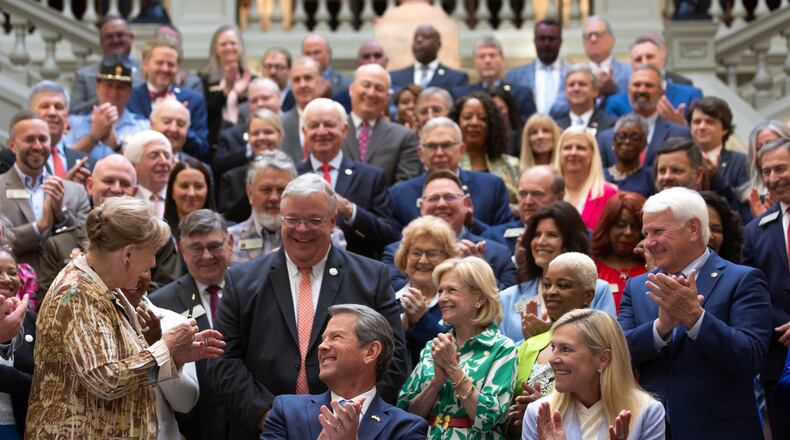The most popular guessing game in Georgia politics is whether Gov. Brian Kemp will run for Senate against Democratic freshman Sen. Jon Ossoff in 2026. With the legislative session over and other eager Republicans waiting in the wings, everybody is waiting for the governor to make his plans known.
But for a whole host of reasons, the answer to whether Kemp will run for Senate may be another question entirely: Why the heck would he want to do that?
Going from chief executive to one of 100 in the Senate has been a struggle for some ex-governors who made the leap. When Tom Carper, a former governor-turned-senator from Delaware, gave a retirement speech for the outgoing Sen. Mike Johanns, a former governor of Nebraska, Carper joked that the two of them were among a group that called themselves “the recovering governors.”
“We’re sort of a support group for one another,” Carper said. “Men and women who used to be somebody and be special.”
Being a senator comes with prestige, but it can feel like a demotion for governors used to signing bills instead of just voting on them. Some have more success making the transition than others.
Both of Virginia’s Democratic senators, Tim Kaine and Mark Warner, were governors before heading to Washington and settling in. But others, like former U.S. Sen. Joe Manchin, D-W. V., quickly became exasperated by the Senate’s crawling pace and deepening partisanship. It was no secret either that Georgia’s former governor-turned-senator, the late Zell Miller, was one of the less fulfilled transplants, too.
In fact, Miller became so frustrated by the Senate’s arcane rules that one of his primary legislative efforts was to change them. The modern Senate was smothering democracy, he said. He retired after four years on the job.
Like some other former chief executives, Miller had gone from being the most powerful person in Georgia when he was governor to being the most junior member of the Senate — all in a city where the president, the speaker of the House and even a major donor might have more power than him on any given day.
Could Kemp adjust to the same change?
To watch Kemp operate in the state Capitol today is to see a man running the show. Right now, the governor controls his schedule, his goals, his travel and his agenda. He seems to actually like the job, and he’s become so uniquely powerful that he mostly sets the Republican Legislature’s agenda, too.
Once Kemp made it known this year that he wanted to pass an overhaul of litigation laws — something that had eluded Republicans for years — the only real questions were how soon the General Assembly would pass his bill and how broad the legislation would be.
If he eventually made his way to the Senate, the legislating portion of the job would be familiar to Kemp, since he was once a state senator. But the rest of the duties in today’s Senate include a heavy dose of everything but lawmaking.
That means copious amounts of time in airports, flying home and back once the Senate sets its vote schedules for the week. It also means “call time” to raise cash and caucus meetings for senior leadership to set the party line.
Add to the mix President Donald Trump’s unique ability to flip every news cycle in Washington upside down, which Republican senators are invariably asked to respond to in Senate hallways, elevators and wherever else reporters can catch up with them.
“Sen. Kemp, are Trump’s tariffs on China good for businesses in your state? Do you agree that Ukraine started the war with Russia? Should Trump run for a third term?”
While Kemp is setting his agenda in Georgia, in D.C. he could expect Trump to be setting the agenda for the Senate as long as he is in the White House — and maybe even after that.
For all of the reasons not to run for Senate, it’s also the next, best step if Kemp wants to stay in public service in 2026.
Republicans have made it known that the nomination to challenge Ossoff is Kemp’s for the taking. If he wants to see the popular Ossoff out of office, the governor must know he’s the Republicans’ best chance get it done.
But that also gets to the biggest challenge anyone will face if they get into the race — the fact that their success may have less to do with their own choices and more to do with Trump’s. As much as voters will be evaluating Ossoff, they may be voting as much or more on Donald Trump. Do they want to give Trump more power or less in Washington? Depending on how voters feel about the president in 2026, Kemp’s decision on whether to run may be beside the point.
There’s no particular deadline for the governor to make his decision. Herschel Walker, who challenged Sen. Raphael Warnock in 2022, made his announcement in August of 2021. And Stacey Abrams held off on her announcement for governor until December of that year. So the Republicans waiting for Kemp to decide may need to get comfortable waiting some more.
In some ways, it’s easier to see Kemp running for president — of the United States, the University of Georgia, or even the Clarke Central High School Alumni Club — than becoming a member of the current calcified Congress. But public service comes in lots of shapes and sizes. And only Kemp and his family can say why he would want to do that and when.
About the Author
Keep Reading
The Latest
Featured




